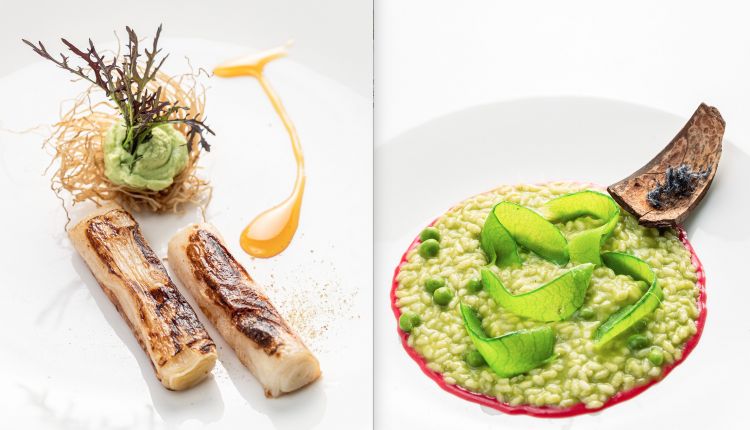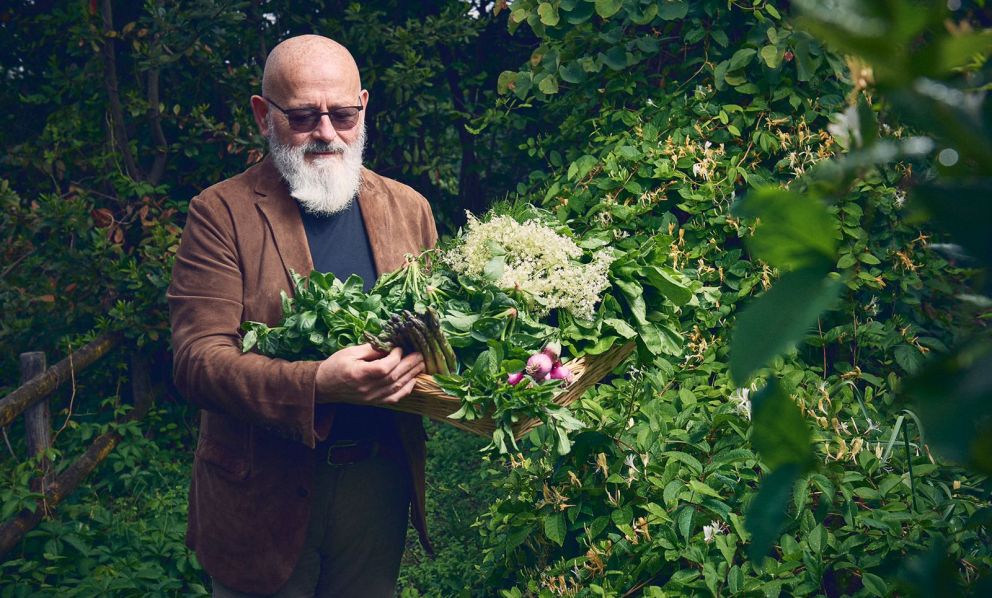


Vegetables, for many a secessionist drift, for others a health precept, or simply a different way of treating food, for some finally a lifestyle choice. Tackling the topic of plant-based cuisine divides the masses and creates confusion among the many food readers, annoyed by seeing the best and most delicious animal proteins excluded from tables and menus. For those who are passionate about food, it is a good idea not to enter into the unresolved discussion between good and bad, but instead it is correct to approach plant-based cuisine with curiosity, with a desire to understand, as one does every time one enters a restaurant with historical and cultural roots. different, which speaks a language that is not known and sometimes not understood.
With this cautious and Savoyard approach I have always approached new restaurants and in the case of veg restaurants, sometimes preceded by the preconception, “You won’t be as good as the others”. Prejudice, always wrong even when dealing with new signs. If veg cuisine has great traditions in foreign cities and in large Italian cities, Turin, as always, breathes new phenomena with difficulty and reworks them to make them understood by its public, which is cautious and much more Savoyard than me.
Because, beyond the sectarian considerations and stadium positions on being vegan or omnivorous, on what the advantages of both factions are and without taking part in either of the two, it certainly seems more interesting to talk about of raw materials and how they change in each other’s homes. And for a few years the city of Mole has been hosting a good movement of vegetarian chefs with some of the most recognized establishments by the general public and food enthusiasts even outside the region. Below we give our contribution to the cause and make a brief and non-exhaustive selection of green cuisine in Turin.

Leek and Maillard and Risotto with ash peas, Antonio Chiodi Latini

Late and raspberry, Antonio Chiodi Latini
It is right to start with Antonio Chiodi Latini, chef of the restaurant of the same name, who expresses his cooking philosophy on himself first of all, with an extraordinary coherence between what you see on the plate and what you hear in his words. His is a choice of substance and not of appearance, a necessity in a journey that has now lasted several years, after having handled all the available proteins for decades. His research is only and exclusively vegetal, so it always remains, truly ennobling the plant in all its components and in all sides of the menu.
Today his cuisine has evolved and become complex, articulated in the choice of elements and their treatment. The vegetal is present, never hidden in elaborations or transformations that can be traced back to omnivorous cuisine, of which he doesn’t even like the references in naming the dishes. He has studied and worked with the vegetable for years and now treats it with confidence and respect. “The beauty of being in the kitchen with vegetables is in the smell you feel in your hands after cooking all day. I still remember the smell they had when I cooked meat or fish.”
If I explain it, you forget it. If you look at it, you remember it. If you taste it, you understand it, says its menu; never has that sense of loss that we often have when faced with the explanation of a dish, which increasingly reminds the writer of a fairy tale, been better expressed; so I follow the stories of Chiodi, as his daughter calls him Georgie in the room, fascinated by the words and I throw myself on sight and taste, where I find acidic and bitter, sweet and sour and savory flavors and the many expressions that vegetables can give if treated with this wisdom.
His is a kitchen of the future because it thinks with the environment and with those who live there. His interpretation of the sandwich is fantastic. Or the tapinambur in 5 essences which is treated not as a root but becomes a main dish, the dish that is reserved for the most important protein. Or broccoli, which is served in cream, cryogenated to be pulverized over the puffed wheat pasta. But this was winter and now there is room for spring which is the vegetable season par excellence: therefore room for strawberries that can be enjoyed in a parsnip carpaccio or risotto with peas in the ash. Here you perceive a close connection with nature, in the dishes with the course of the months and seasons and in the dining room, where a balance and serenity reign that certainly depends on what and how you cook.

Pasta and chickpeas, Soul Kitchen

Love, roots and tubers, Soul Kitchen
The second place veg par excellence in Turin is Soul Kitchen, by the chef Luca André. A restaurant first and foremost, which has been feeding around 50 people per evening for 10 years; where it is right to go regardless of the limits to your diet because here you do research on ingredients and recipes without limiting the satisfaction of taste that turns away non-fans of the color green.
Chef Andrè does a long and difficult research job to prepare his dishes. He seeks to bring his restaurant to have a complete menu without the absence of the second course which for many is the center of the meal. He searches to try to build with the vegetable in the imaginary appearances and taste typical of an omnivorous restaurant. He seeks to improve understanding and surprise the customer in finding a taste that does not match the expected ingredient.
To do this it is necessary to open collaborations with innovative companies and producers (Italian and otherwise) who process vegetables in a natural way with cutting-edge technologies, to replace not only meat and fish but also egg, milk or cheese, with products that are always up to par not only in terms of taste, but also from a strictly technical point of view. Yes, because technology is changing the narrative of vegetables and continuing to consequently enrich vegetarian cuisine.
So we work and experiment to bring back to those who have made a veg lifestyle choice, tastes and flavors that hark back to the cuisine of omnivorous childhood and to those curious about food, new tastes from the work of old and new raw materials. The cheese made with cashews, coconut and chickpeas, or the meat drawn by a 3D printer after being produced from a mixture of vegetables that builds its texture and flavor in a truly impressive way. Removing is initially simple, after all Marchesi also said so, but then reconstructing visual, tactile and tasteful sensations is a little less so. We live accustomed to palatal sensations that vegetable chefs try to follow so as not to remove too many references and not make their paths less welcoming.
The menu has oriental references in the Daikhimi where the daikon is served with celery and alkekengi or in the Capunet which is constructed with cabbage but filled with shitake pepper, kimchi and pakchoi. But we stay in Piedmont with spaghettoni with Nebbiolo and with rice, white, red and green green, with onion and green shiso. Then the second courses with the cuts of Redefine meat (speaking of companies that invest in food technologies) and desserts, such as the fantastic Pastiera Napoletana, where there are many ingredients that must find a vegetable counterpart.
But because there is not only haute cuisine in Turin, for those who want to try a more informal veg restaurant we suggest two other addresses.
The Garden Already Salsamentario, Nole Djokovic’s favouriteIt is known in the news that the number 1 in world tennis passing through Turin for the ATP Finals stopped more than once from Eduardo Ferrante and his Orto Gia Salsamentario, an institution among the vegetable restaurants in Turin. And to think that the restaurant was born in 2017 from the remains of a delicatessen more than 100 years old, in via Monferrato right in front of the Po. A restaurant that puts customers at ease thanks also to the smile of the chef and his positivity that is transmits to the whole room, with its motto #lortospacca. At the Orto you can find classic Italian dishes revisited in a vegetal key, such as Lingua dell’orto or tomini, or the fantastic Russian salad. The first courses are ravioli served with a white ragout of almonds and potatoes or rice with artichokes and cashew cream. At this point Novak it is also in a second course, composed of three mini burgers of carrots, almonds and dried tomatoes, dried and served raw with cashew and turmeric cream.
From breakfast to dinner in the center of Turin: La mezzaluna
The latest veg restaurant in Turin is Mezzaluna. A stone’s throw from Porta Palazzo, in the Roman quadrilateral of Turin, the Mezzaluna is a perfect place for a completely vegetal passage, from breakfast to the practical buffet lunch, until the evening for a more varied and profound à la carte proposal. The restaurant was founded way back in 1994 by two Turin residents Daniela Zuccari And Claudio Vianowho named the place this way, in memory of high school history books, when the fertile lands of Mesopotamia were mentioned.
Daniela prepares desserts for breakfast in the kitchen, as well as dishes for lunch and dinner. The vegan Russian salad is excellent, as are the Vegan Pad Thai or the Mexican chili with black beans and soy stew, served with tortilla chips. The atmosphere is very homely and the service is very attentive and here too the smile never fails. Is it thanks to vegetables?

